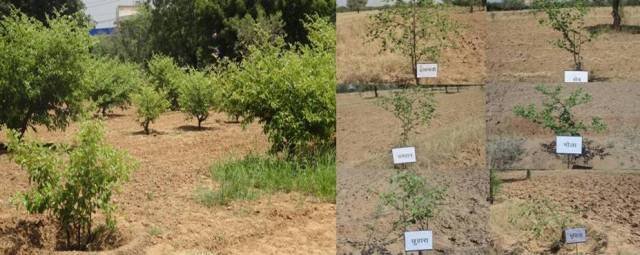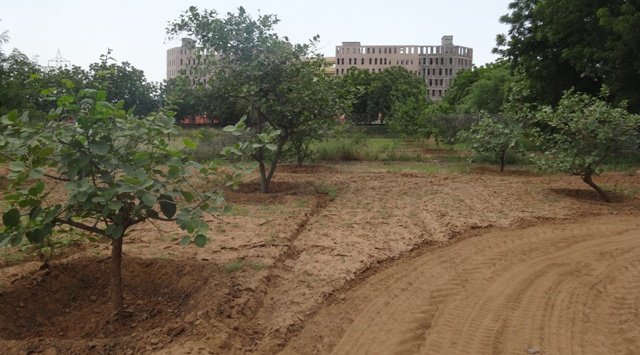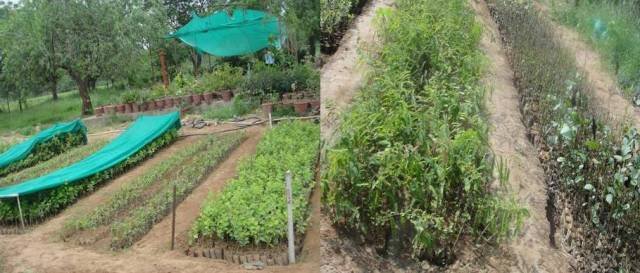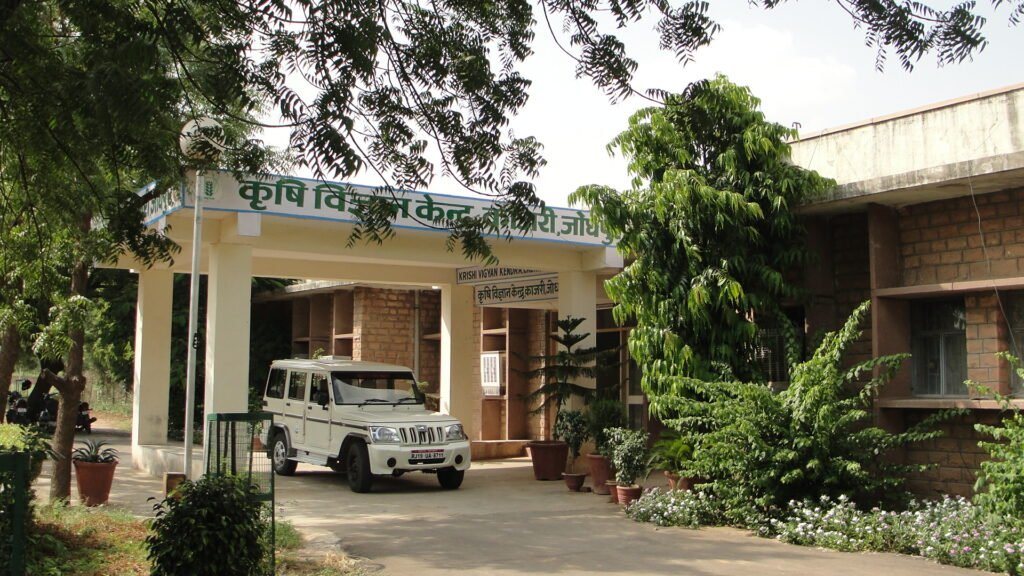Demonstration Units

The KVK has a well developed dairy as a demonstration cum experimental unit. This dairy unit has about 96 Tharparkar animals. The breed is native of Thar Desert with home tract involving mainly Jaisalmer, Barmer and Jodhpur districts. The breed is acclimatized to arid conditions with all characters of good dairy animals.
In the starting, twenty one Tharparkar cattle were procured from Central Cattle Breeding Farm (CCBF), Suratgarh in the year 1986.They were maintained at Regional Research Station of CAZRI, Bikaner. These animals were later on shifted to KVK Campus of the main institute at Jodhpur in the year 1990 consequent to prolonged drought conditions at Bikaner. At KVK, these animals were maintained for research-cum-demonstration purpose in collaboration with Division of Animal Studies. Initially, the animals were maintained in old sheep-goat sheds but later on shifted to newly constructed livestock shed in 1995.
Orchard produces fruits. The Krishi Vigyan Kendra has four orchards:
- BER

- POMEGRANATE

- AONLA

- GUNDA

The total area under demonstration of Orchard is 0.85ha at KVK. Out of total 0.85ha, 0.35ha is under Ber Orchard, 0.30ha is under Pomegranate Orchard and 0.20ha is under Aonla+Gunda Orchard. The Orchards having improved varieties of Ber i.e. Gola, Seb and Umran; improved varieties of Pomegranate i.e. Jalore seedless; improved varieties of Aonla i.e. Chakaiya and N.A.-7. The trainees and farmers and other visitors visit the unit to understand and learn quality fruit production technology and adopt the methodology /technology in his field. The mother plants for propagation of new seedlings of Ber, Pomegranate, Aonla and Gunda is available in the Orchard.

The Nursery is situated nearby the KVK office. Budded Ber, Gunda, Pomegranate and Ornamental plants are produced in Nursery. Quality planting material of Ber, Aonla, Pomegranate and Gunda (Lasoda) is produced in huge amount in the Nursery. Trainees learn the propagation technology of fruits, forest and different ornamental plants. Trainees learn by doing and do by learning of technology in the nursery.

There is a Vermi-Compost demonstration Unit at KVK. Farmers visit the unit for learning purpose. The unit produces vermi-compost and earth worm as well as vermiwash. Vermi compost is a part of organic farming which is required for quality production in present agricultural scenario.
- Silvi-Pastoral – When Trees are grown with Grasses (Silvi-pastoral)

Traditional silvi-pastoral systems are integral part of traditional agro forestry of
desert region of Rajasthan. Arid region of Rajasthan is reported to have 89 species of grasses.
At KVK, CAZRI, Jodhpur total 11.5ha area is covered under Silvi-pastoral system. The basic objective of the system is to supply fodder to the dairy unit and small ruminants also, production of grass seed and supply it to the farmers for increasing the area, production and productivity of the fodders under fodder production at farmers field. In Silvi-pastoral system there is Dhamann grass (cenchurus ciliaris) and Khejri (Prosopis Cineraria) variety CAZRI-358 at instructional farm of KVK under the system.

Azolla is a freshwater floating fern, grown naturally in stagnant water. In arid region of Rajasthan, availability of green fodder for livestock is not certain. Its availability totally depends upon monsoon. Azolla is the best substitute of green fodder in arid region of Rajasthan. Farmers can produce Azolla with minimum water and at low production cost throughout the year for their animals. It is very rich in proteins, vitamins (A, B12, Beeta carotene), growth promoter and minerals (Calcium, Phosphorus, Copper, Ferrous, Potassium and Magnesium). Its nutrient composition makes it a highly efficient and effective feed for Livestock. Fresh Azolla should be washed before feeding to get rid of the dung smell. It can be feed directly to livestock or added to the regular feed. It can be mixed with home- made concentrate in the ratio of 1:1. Thirty percent cake can be replaced in the ration of livestock.

- Nutritional Kitchen Garden
KVK, CAZRI, Jodhpur has developed a model nutritional kitchen garden to demonstrate farmers/farmwoman who visits at KVK.
- Mini Soil Testing Laboratory
KVK, Jodhpur is sanctioned the laboratory in 2015 by ICAR. For maintenance of soil health, soil samples are tested and analyzed in the lab. As per the testing results the farmers are recommended to use micro nutrients on their fields to overcome the deficiency of soil elements. The basic objective testing the soil samples is to increase the production and productivity of farmer’s field.
Infrastructure
- Administrative Building

The Krishi Vigyan Kendra has well developed administrative building having training hall and laboratory. The training hall is e well furnished & supported by the audiovisual aids.
- Farmers’ Library
Krishi Vigyan Kendra has a wide collection of books and Leaflet/Folders on all the fields of agriculture. All these books and Leaflet/Folders are available to farmers and staff for reference at free of cost.
- Computer Cell
KVK has a well furnished computer Cell. All the computers are connected with broadband internet connection facility.
- Training Hall
The KVK has a well furnished training hall supported by the audiovisual aids where about 40 trainees could be trained at a time.
- Home ScienceLaboratory
The KVK has a well developed home science laboratory where the practical training programmes are conducted for farm women. By products are prepared during different training programmes for farm women.
- Farmers’ Hostel

The Krishi Vigyan Kendra has a well furnished farmer’s hostel that can accommodate about 24 farmers at a time. The facilities are also available to outside farmers who visit us during study tours on nominal charges. The hostel is equipped with solar lights.
- Farm

The Krishi Vigyan Kendra possesses 21 hectares of land out of which 18.5 ha is under cultivation of crops, pasture etc. and remaining land is covered by the administrative building, demonstrations units . The main purpose of the farm is to demonstrate the latest agricultural technologies. It also acts as a tool to do applied research on agricultural Technologies & undertake trials before their transfer to farmers’ field. After a careful planning, the farm was divided in to four major blocks of Horticulture, Crop Production, Agro-forestry and Natural block (Caparis desidua). The farm also has Ber and pomegranate orchard and horticultural nursery.